Zoom
Trash

Data citation poster. Directory of Open Access Journals. Scholarly communications and data - ANDS. Who should read this?
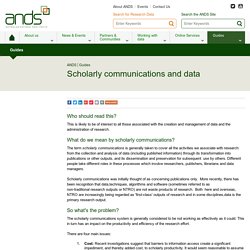
This is likely to be of interest to all those associated with the creation and management of data and the administration of research. What do we mean by scholarly communications? The term scholarly communications is generally taken to cover all the activities we associate with research: from the collection and analysis of data (including published information) through its transformation into publications or other outputs, and its dissemination and preservation for subsequent use by others. Different people take different roles in these processes which involve researchers, publishers, librarians and data managers. Scholarly communications was initially thought of as concerning publications only. So what's the problem? The scholarly communications system is generally considered to be not working as effectively as it could. There are four main issues: What can be (and is being) done about it?
Australian Government's Response For further information. National Scholarly Communications Forum. The 24th National Scholarly Communications Forum was held on 7 September 2015 at The Australian National University, Canberra.
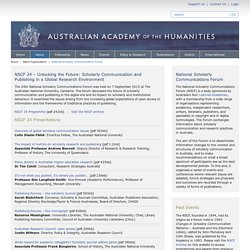
The forum discussed the future of scholarly communication and publishing in the digital era and its impact on scholarly and institutional behaviour. It examined the issues arising from the increasing global expectations of open access to information and the frameworks of traditional practices of publishing. NSCF 24 Programme [pdf 242kb] | Visit the NSCF archive NSCF 24 Presentations Overview of global scholarly communication issues [pdf 503kb]Colin Steele FAHA: Emeritus Fellow, The Australian National University The impact of metrics on scholarly research and publishing [pdf 1.2mb]Associate Professor Andrew Bonnell: Deputy Director of Research & Research Training; Professor of History, The University of Queensland Policy drivers in Australian higher education research [pdf 425kb]Dr Tim Cahill: Consultant, Research Strategies Australia.
Identifying Scholarly Sources - Scholarly Sources - LibGuides at University of Wisconsin-Green Bay. The purpose of a scholarly source is to inform, report, or make available original research (e.g., experiments, case studies, analyses).
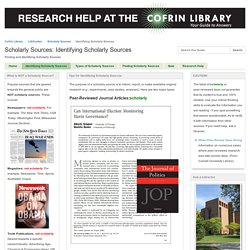
Here are two major types: Peer-Reviewed Journal Articles:scholarly Criteria Checklist for Peer-Reviewed Journal Articles: Authors: Experts in their field (e.g., professor, doctor, lawyer, researcher, scholar). Institution and credentials often listed, e.g., "Mary Kay Jones, Ph.D., is professor of political science at Harvard University. " Length: Generally, at least 5 pages long. Format: Text-heavy. Content: Based on original research such as an experiment, case study, or analysis. Sources: Always cites sources used. Books and Book Chapters: sometimes scholarly Criteria Checklist for Scholarly Books & Book Chapters: Authors/Editors: Experts in their field (e.g., professor, doctor, lawyer, researcher, scholar).
Publisher: Look inside the book cover. Format: Text-heavy. Content: Based on original research such as an experiment, case study, or analysis. The value of research data - ANDS. The economic value of Australia's research data is becoming increasingly apparent.
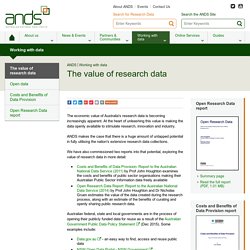
At the heart of unleashing this value is making the data openly available to stimulate research, innovation and industry. ANDS makes the case that there is a huge amount of untapped potential in fully utilising the nation's extensive research data collections. We have also commissioned two reports into that potential, exploring the value of research data in more detail:
Scholarly Communications @ Duke - Discussions about the changing world of scholarly communications and copyright. It is frequently interesting, and sometimes appalling, to see how a court that does not usually deal with copyright issues reacts when confronted with one.
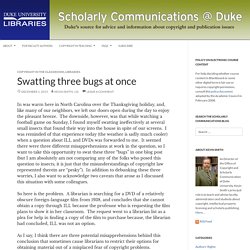
Judge Amy Berman Jackson of the U.S. District Court for the District of Columbia is certainly not a complete novice regarding copyright, but the issue she confronted in Drauglis V. Kappa Map Group must certainly have been a new one for her. It is a case involving the scope and interpretation of a Creative Commons license, and Judge Jackson deals quite well with it, in my opinion, in a decision issued last week. But she is drawing lines in this case that I am quite sure will be discussed and readjusted over the next few years. The facts in the case pose a situation that anyone familiar with CC licensing could probably have seen coming. The lesson from this part of the story is clear; rights holders need to think carefully about the terms of the licenses they imply.